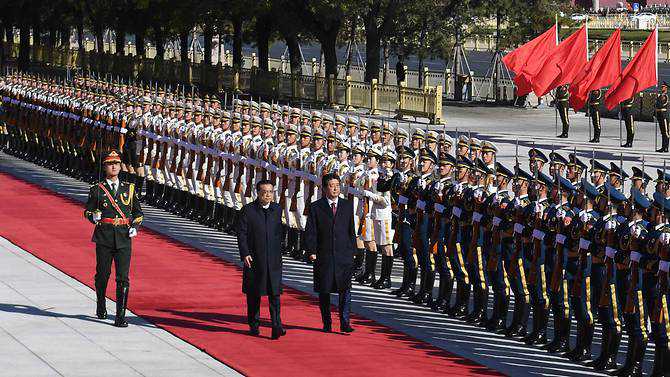Commentary: Mega projects herald a new dawn in China-Japan relations
31 October, 2018

On the first state visit to China by a Japanese leader in 11 years, Prime Minister Shinzo Abe and President Xi Jinping announced 50 joint infrastructure projects.
This embrace of joint infrastructure investment cooperation through the Belt and Road Initiative in all but name is on a scale even larger than was anticipated before Abe’s arrival in Beijing.
There was also a raft of other announcements that will help normalise the political relationship between the two Asian giants that share one of the largest economic relationships in the world. But the most consequential of those could be the joint investment in infrastructure projects.
China’s welcoming of Japan to undertake joint projects is a sign of a change in approach to rolling out its Belt and Road Initiative. Mr Xi’s signature project has found resistance both abroad and at home, and many of the risks have materialised, resulting in failed projects bringing economic and political costs.
For Japan it’s a pragmatic way to engage China. As Chinese policymakers search for ways to better deploy the country’s vast sums of capital abroad, Japan has experience of doing just that dating back to the 1970s — including of geopolitical pushback.
Understanding that the Belt and Road is here to stay, Japanese engagement can shape the massive investments and get more business for its companies. It’s also a part of a broader hedge against an increasingly uncertain Japan–US relationship.
INFRASTRUCTURE INVESTMENTS
Asia needs a large volume of infrastructure investment to achieve potential growth rates that will continue to exceed the global average. Competition from different sources of infrastructure investment is a positive development, as is some cooperation.
Increased competition will result in improved outcomes, both in terms of the scale and the quality of infrastructure investment, so long as recipient countries have the capacity to assess alternative project proposals, have good governance and are clear about the consequences of projects that fail.
Infrastructure investment that is undertaken adhering to the principles of open tenders and transparency will reduce the likelihood of failed projects and improve the outcomes for both investors and host communities. But projects will still involve risk and, inevitably, not all will produce benefits for the investors and the recipient communities.
East Asia has a particular interest in leading cooperation to build up understanding of the principles that are needed to govern productive infrastructure investment and to help build capacity to manage infrastructure investment in recipient countries.
East Asia is home to established forums for cooperation — with ASEAN, Asia-Pacific Economic Cooperation and the East Asia Summit (EAS) — and is home for major investors and recipient countries. This cooperation, however, also needs a trans-Asian element that includes South Asian countries.
South Asia is best and most constructively engaged through EAS or in active economic arrangements such as the Regional Comprehensive Economic Partnership agreement. Getting it right in East Asia will help to get it right in the rest of the world.
REGIONAL COOPERATION
Failed infrastructure projects — those that are not economically or socially efficient — create large losses for investors and do not bring needed benefits to recipient countries. They can also hamper investment elsewhere by causing investors reputational damage and reducing the capital available for investment.
Regional cooperation can help with building consensus around principles for investors and recipients, capacity to assess projects, capacity to put together tenders and with mediation between parties in the event of failed projects.
A region that has in the past avoided legally-binding cooperation due to diversity and complicated relationships will not readily or sensibly move towards a dispute settlement mechanism, even if it is a truly multilateral process. Indeed, cross-border infrastructure is already a contentious issue.
In infrastructure investment there will always be significant risks for both investors and recipients. Measures to diversify project and political risk by forming consortiums — just as China and Japan have announced — are a pathway to be encouraged.
The experience of some failed projects leading to large losses and recipient countries becoming indebted have caused concern in the global community and reputational damage. An investor often has little option but to swap debt for an equity stake to minimise further recipient losses but that can be a poisoned chalice.
MITIGATING RISK AND FAILURES
A third-party regional or multilateral process that mediates disputes after failed projects would help to avoid outcomes that cause suspicion and reputational damage and can limit economic costs.
Such a process would need to be closely tied to the agreed principles of infrastructure investment and inform the proposal and implementation of projects.
These processes might be mediated by established regional institutions, such as the Asian Development Bank and Asian Infrastructure Investment Bank, and sensibly related to existing multilateral institutions and processes, such as the World Bank’s Multilateral Investment Guarantee Agency.
The logo of Asian Infrastructure Investment Bank (AIIB) is seen at its headquarter building in Beijing January 17, 2016.REUTERS/Kim Kyung-Hoon
An independent external process that provides viable options for restructuring debt or resolving ownership of loss-making or non-performing assets can help to avoid contentious outcomes that spill over into geopolitical dealings.
Joint projects by China and Japan have opened up a conversation with China on principles for difficult cross-border infrastructure projects.
China’s neighbours now need to engage with the country in a conversation about how to best to mitigate the risks and find ways to adequately resolve the failures, of which there will inevitably be some.
